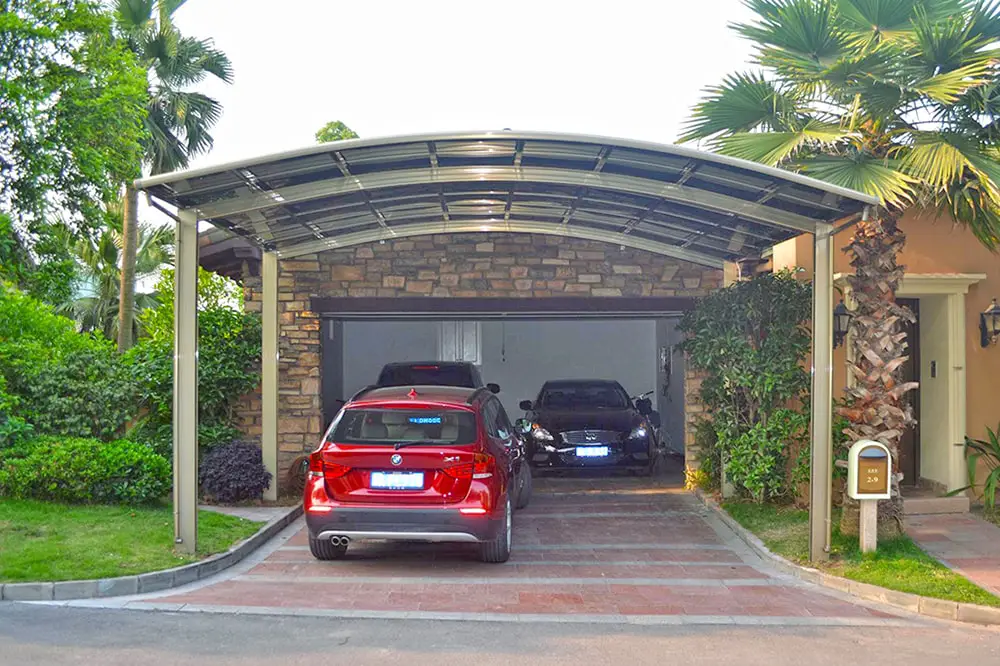Understanding all the facets of your homeowners insurance policy is essential. It details main home coverage and secondary structure coverage. So, does home insurance cover damaged carports?
Homeowners insurance will typically cover the cost to repair a damaged carport if it was damaged by one of the covered perils. When the insurance company assesses the claim, they will make make a determination based on whether the carport is attached or detached.

If the carport is attached to your house, it will be covered under dwelling coverage A in a standard insurance policy. This means it will be considered part of the main dwelling. If the carport is considered detached, it will be covered under other structures coverage B. This means it will be considered a secondary structure.
Exactly how does a detached carport differentiate from an attached carport? Keep reading to see how insurance views each of these secondary structures.
- The attached carports are covered under the main dwelling/structure portion of a standard homeowners policy.
- Detached carports are considered secondary structures.
- Secondary structures have a limit of 10% of the dwelling coverage limit for most homeowners insurance policies.
- You can buy additional coverage to protect secondary structures more thoroughly.
Attached carports
Carports or garages that touch your house directly, such as the corner of the roof, are covered by the dwelling amount in the event of a claim. What this means is that a carport that is attached to a home or touched a home is considered part of the main dwelling itself. So if you have a homeowners insurance policy of $400,000 and a $1,000 deductible, the carport will fall under this policy.
A midway that connects a carport to a home or a small breezeway with just a roof cover qualifies a carport as an attached structure. If, however, the carport is completely separate, it will fall under a different category for insurance purposes.
Detached Carports
If you have a carport that is detached from the house and does not touch it in any way, then this carport will be listed as a secondary dwelling and will not be covered by the main coverage provided to the home.
Assume that you have a two-car garage that is separate from your house. To ensure the garage is properly insured, increase your other structures coverage from regular 10% to 25% of the dwelling amount if the garage is worth $45,000 to build and your dwelling coverage limit is $200,000.
Structures that do not touch your main home are covered by the other structures coverage. Other structures coverage pays for claims on things like garages, carports, storage sheds, and secondary dwellings on your property.
If these structures are damaged, the other structures coverage is used to pay for the repairs. It may be a good idea to consider other types of policies if you have a secondary dwelling on your property along with your main dwelling. Those situations should be discussed with your agent.
Example of covered events: attached carports
If you have a carport that has just been damaged, you may be wondering if the damage is covered by home insurance. When looking at damage to an attached carport, it is important to determine what your homeowner policy covers for the main structure, as the guidelines will match. Some common examples of such coverage are:
- Lightning or fire. If a lightning storm strikes your attached garage and damages it or causes it to set on fire, it will be covered under your standard policy.
- Hail or windstorm. If a hurricane runs through, or a severe thunderstorm rips apart your attached garage or causes similar damage, your homeowner covers this peril.
- Falling objects. If a tree falls over suddenly and takes out your attached garage, your regular policy will kick in to cover the damage after the deductible.
- Aircraft. If a plane or other aircraft were to fly into or crash into your home, your regular insurance policy would cover the event.
- Vandalism. Some neighborhoods are not the best, and certain extreme events like riots can cause damage due to vandalism if you are affected by this type of event, it’s covered.
- Volcanoes. If a volcano erupts and causes damage to an attached garage, insurance will cover the costs.
- Weight of snow or ice. If you live in an area with a lot of snow and ice, you should try to maintain it by removing it from roofs. If you don’t and it causes damage to the attached garage, insurance will cover it if it is not from negligence.

As you can see, if your garage is attached, it is covered for most perils and a limit for your reimbursement is as high as the dwelling coverage limit, which is typically set at the replacement cost value of the home. This is especially useful, as many people use their garages as storage for equipment and their vehicles.
Examples of covered events: detached carports
If you have a detached carport, then insurance coverage looks quite different. Your insurance will view this as a secondary structure and will typically only cover the damages up to 10% of your dwelling coverage limit. This amount might be not enough in some cases, so it’s advised to adjust the limit of your other structures coverage B to account for your detached carport. The perils covered for other structures are generally the same as for dwelling coverage and include:
- Wildfires
- Falling objects
- Hailstorms
- Explosions
- Vandalism
- Wind damage
Essentially, the basic perils that are covered from a main home are still covered, but the maximum amount you can receive for the damage is drastically smaller than if the garage was an attached structure. If your garage has a high value, it is recommended that you invest in a larger percentage of coverage to prepare for the worst.

When you can’t use home insurance for carports
There are instances when your carport will be excluded from the homeowners insurance altogether, e.g. if you are using it for any type of business purposes, such as a temporary mechanic area in the evenings where folks are paying you to fix their cars. Homeowners insurance won’t cover the carport unless it is strictly used for personal reasons. If being used for work-type use, you would need to get commercial insurance to cover it. This is so you have things such as:
- Property coverage
- Contents
- Liability
- Workers comp
Commercial coverage protects you as a business owner, the carport as an office property, as well as all of the contents and equipment that you use to perform your job duties. It also allows liability in case there are any customers who may have property damage or become injured while on your premises and workers comp if you choose to have any employees who could experience an injury on the job.
Carport coverage is essential
Your homeowners insurance will cover your carport in some manner, whether it is attached or detached. The most important thing to do before selecting an insurance plan is to understand how the company will categorize your carport. Once that’s done, it is smooth sailing from there.

